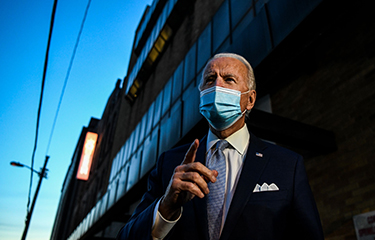Just before Joseph Biden was sworn in as president of the United States a month ago, his chief of staff, Ronald Klain, laid out the obstacles ahead for the administration.
“We face four overlapping and compounding crises: the COVID-19 crisis, the resulting economic crisis, the climate crisis, and a racial equity crisis,” Klain wrote in a memorandum issued to staff on 16 January.
This memo, the new Congress, and the initiatives Biden has highlighted in the first few weeks at the helm of the country have created signposts for how the new presidency could play out, according to National Fisheries Institute Vice President of Government Affairs and General Counsel Robert DeHaan.
“It’s helpful to think about what the administration will look like, focusing on those four priority buckets,” DeHaan said, referring to the crises detailed in Klain’s memo. “Those buckets will drive policy prioritization across the administration, especially where the issue is amenable to presidential action and doesn’t require congressional input or approval as through the legislative process.”
Biden takes office “in a time when the country is very divided, and the Congress reflects that,” DeHaan said during NFI’s Global Seafood Marketing Conference last week. This division, he said, could compel Biden’s administration to take one of two diverging paths.
“The president is looking at a very divided [House of Representatives], and it will color the types of things he wants to prioritize on his own,” DeHaan said. “In a sense, what we could have is two different administrations: One administration that acts in a fairly aggressive, ideological sense that is meant to fulfill campaign promises to the president’s base, where his field of action is unrestrained; The budget reconciliation action on COVID relief today is an illustration of that. The other is a fairly incremental, modest administration that is focused on winning some legislative battles in the Congress by luring some Republicans over to the majorities in both chambers, or simply not acting [or] deferring action until a time when the possibility for legislative action is better.”
“Those of you who read intensively news out of Washington D.C. know that rivers of ink are being spilled right now about various aspects of what a Biden administration will look like and what those policies look like,” he said. "But putting aside some of the speculation, there’s lots of things we generally know about what the administration’s going to do – the general arc of the administration’s policy – and what’s possible.”
As for regulation, “this will be a very pro-regulatory presidency,” DeHaan said, which brings with it several implications for the seafood industry.
“The president has already rolled back some Trump administration regulatory policies that were deregulatory in nature. What does that mean for seafood? I think on environment, worker safety and health, labor rights, you’ll see a very aggressive administration stepping out on a lot of areas, some of which will affect the seafood operating environment, particularly on labor and the environment," he said. "COVID, of course, has a big impact on what that will look like."
On the environmental front, DeHaan expects major rollbacks of rules enacted by the Trump administration, such as the National Environmental Policy Act (NEPA).
“For many of your businesses, that won’t have a significant directed impact, though for some it will,” DeHaan told the NFI audience.
DeHaan said Biden's administration will “be very much driven by the [COVID] situation in the states, the status of the lockdowns, the success of a vaccine, in terms of them delivering its economic policy.”
“The spending posture of the government is going to be COVID, COVID, COVID, and more COVID,” he said.
With respect to the economy, “one thing I think you can be fairly confident in predicting is that this Federal Reserve and this White House will want to keep interest rates very low, and that has a whole series of knock-on effects for your business,” according to DeHaan.
It’s fair to expect Biden and his team to “be cautious and…reluctant to make major wholesale changes” to Trump trade policies that garner “significant working class support and especially union labor support,” DeHaan said.
“For those policies that are problematic for our industry – and there are many – it will be challenging to secure major rollbacks of Trump administration policies because the those who support them in the upper Midwest are exactly the voters Biden will want to appeal to in a second-term run,” he said.
Overall, “climate change, COVID, and a strong belief in multilateralism that his predecessor does not share, will be the watchouts for this administration’s foreign policy,” DeHaan added.
NFI and DeHaan see “an opportunity for seafood to understand, react, and capitalize on the agenda that the administration will pursue in the coming months.” The organization plans to recap the first-quarter actions of the Biden administration in an upcoming webinar scheduled for April.
Photo courtesy of John Smith Williams/Shutterstock







